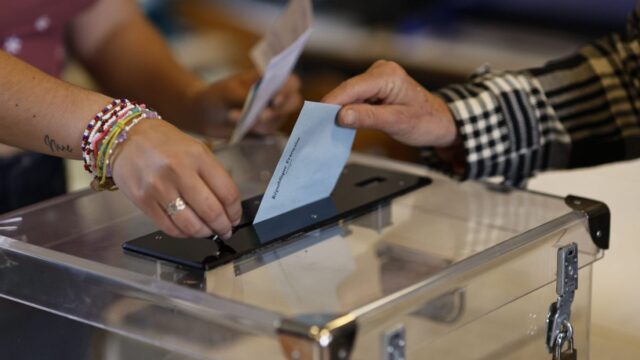As the second round of early elections in France begins, no one knows for sure whether a right-wing government will come to power or whether there will be an undecided Parliament.
In France, the second round of crucial elections has begun that They could give a historic victory to the far-right National Rally of Marine Le Pen or leading to a blank Parliament and years of political stagnation. In the first round, on June 30, The National Group obtained the greatest victory in its history.
Sunday’s vote determines which party controls the National Assembly and who will be prime ministereither. If support for Macron’s weak centrist majority erodes further, he will be forced to share power with parties opposed to most of his pro-business and pro-European Union policies.
Official participation is high
As we have been able to verify with data from the French Ministry of the Interior, the Participation at 12:00 p.m. in the second round is 26.63%. The first round marked a milestone in participation with 25.9%, well above previous French legislative elections.
This implies participation at 12:00 p.m. 0.73% more than last Sunday.
Many parties withdrew their candidacy for this second round in an attempt to stop the extreme right which marked a very high result in the first round.
The result remains very uncertain
The polls carried out between the two rounds suggest that the National Group could obtain the largest number of seats in the National Assembly, of 577, but it would not reach the 289 seats necessary for the majority.
If he wins the majority, Macron would be forced to sharing power in an awkward arrangement known in France as cohabitation.
Another possibility is that no party wins a majority, which would result in a hung Parliament.
That could lead to Macron to seek coalition negotiations with the center-left or to appoint a technocratic government without political affiliations.
Both options would be unprecedented in modern France and would make it difficult for the European Union’s second-largest economy to make bold decisions on arming Ukraine, reforming labor laws or reducing its huge deficit.
Financial markets have been nervous since Macron surprised even his closest allies in June by announcing early elections after the National Rally won the largest number of seats for France in the European Parliament elections.
Many French voters, especially in small towns and rural areas, they are frustrated with low incomes and a Paris political leadership seen as elitist and unconcerned with the daily struggles of workers.
The National Group has connected with those votersoften blaming immigration for France’s problems, and has gained wide and deep support in the last decade.
30,000 police deployed
Racism and anti-Semitism have marred the election campaign, along with Russian cyber campaigns, and More than 50 candidates have reported being physically attacked, something very unusual in France.
The Government is going to deploy 30,000 police on voting day, “so that the extreme left or the extreme right” does not create “disorders”“, announced the Minister of the Interior, Gérald Darmanin, on Thursday.
“Something is happening that borders on the liberation of violence,” Darmanin declared in an interview given on Thursday to ‘France 2’, after the attack suffered by the Government spokesperson, Prisca Thévenot.
The escalation of tensions occurs while France celebrates the Olympic Gamesand while The national football team reaches the semi-final of Euro 2024as well as the Tour de France tours the country with the Olympic torch.
Meanwhile, 49 million voters They are immersed in the most important elections in the country in decades.
France could have its first far-right government since the Nazi occupation in World War II if the National Rally obtains an absolute majority and its leader, Jordan Bardella28, becomes Prime Minister.
The party won the first round of last week’s elections, followed by a coalition of center-left partiesextreme left and Greens, and Macron’s centrist alliance.
Elections end late Sunday
The pen has softened many of the party’s positions. For example, no longer advocates leaving NATO and the EU.
The second round of the elections began on Saturday in the French overseas territoriesfrom the South Pacific to the Caribbean, the Indian Ocean and the North Atlantic.
The elections end on Sunday at 8:00 p.m. in mainland France. The first projections of the polls are expected on Sunday night, and the first official results are expected late on Sunday and early on Monday.
Macron said he will not resign and that he will remain president until his term ends in 2027.







